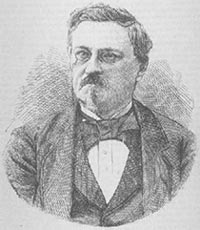Quelle: The Production of Security (1849), p. 25
Gustave de Molinari: Zitate auf Englisch
Quelle: The Production of Security (1849), p. 34-35
Kontext: Everywhere, when societies originate, we see the strongest, most warlike races seizing the exclusive government of the society. Everywhere we see these races seizing a monopoly on security within certain more or less extensive boundaries, depending on their number and strength.And, this monopoly being, by its very nature, extraordinarily profitable, everywhere we see the races invested with the monopoly on security devoting themselves to bitter struggles, in order to add to the extent of their market, the number of their forced consumers, and hence the amount of their gains.War has been the necessary and inevitable consequence of the establishment of a monopoly on security.Another inevitable consequence has been that this monopoly has engendered all other monopolies.
“This form of the organization of production has been named communism.”
Quelle: The Production of Security (1849), p. 31
Kontext: If the roused and insurgent consumers secure the means of production of the salt industry, in all probability they will confiscate this industry for their own profit, and their first thought will be, not to relegate it to free competition, but rather to exploit it, in common, for their own account. They will then name a director or a directive committee to operate the saltworks, to whom they will allocate the funds necessary to defray the costs of salt production. Then, since the experience of the past will have made them suspicious and distrustful, since they will be afraid that the director named by them will seize production for his own benefit, and simply reconstitute by open or hidden means the old monopoly for his own profit, they will elect delegates, representatives entrusted with appropriating the funds necessary for production, with watching over their use, and with making sure that the salt produced is equally distributed to those entitled to it. The production of salt will be organized in this manner.This form of the organization of production has been named communism.When this organization is applied to a single commodity, the communism is said to be partial.When it is applied to all commodities, the communism is said to be complete.But whether communism is partial or complete, political economy is no more tolerant of it than it is of monopoly, of which it is merely an extension.
Quelle: The Production of Security (1849), p. 24
Kontext: But why should there be an exception relative to security? What special reason is there that the production of security cannot be relegated to free competition? Why should it be subjected to a different principle and organized according to a different system?
Quelle: The Production of Security (1849), p. 47
“If there is one well-established truth in political economy, it is this:”
That in all cases, for all commodities that serve to provide for the tangible or intangible needs of the consumer, it is in the consumer’s best interest that labor and trade remain free, because the freedom of labor and of trade have as their necessary and permanent result the maximum reduction of price.
... Whence it follows:
That no government should have the right to prevent another government from going into competition with it, or to require consumers of security to come exclusively to it for this commodity.
Quelle: The Production of Security (1849), p. 3, as cited in: Hans-Hermann Hoppe (2001), Democracy - the God That Failed: The Economics and Politics of Monarchy, Democracy, and Natural Order. Transaction Publishers, p. 271
Quelle: The Production of Security (1849), p. 51
Quelle: The Production of Security (1849), p. 22
Quelle: The Production of Security (1849), p. 15-16
Quelle: The Production of Security (1849), p. 22–23.
Quelle: The Production of Security (1849), p. 34-35
Quelle: The Production of Security (1849), p. 27–28
Quelle: The Production of Security (1849), p. 34-35
Quelle: The Production of Security (1849), p. 40
Quelle: The Production of Security (1849), p. 44-45
Quelle: The Production of Security (1849), p. 22
Quelle: The Production of Security (1849), p. 32
Quelle: The Production of Security (1849), p. 17-18
Quelle: The Production of Security (1849), p. 57-59
Quelle: The Production of Security (1849), p. 22
Quelle: The Production of Security (1849), p. 50
Quelle: The Production of Security (1849), p. 60-61
Quelle: The Production of Security (1849), p. 20-21
Quelle: The Production of Security (1849), p. 31
Quelle: The Production of Security (1849), p. 57-59
In this system the government plays a preeminent role, because it is upon it, the custodian of the principle of authority, that the daily task of modifying and remaking society devolves.<p>According to others, on the contrary, society is a purely natural fact. Like the earth on which it stands, society moves in accordance with general, preexisting laws. In this system, there is no such thing, strictly speaking, as social science; there is only economic science, which studies the natural organism of society and shows how this organism functions.
Quelle: The Production of Security (1849), p. 15-16
